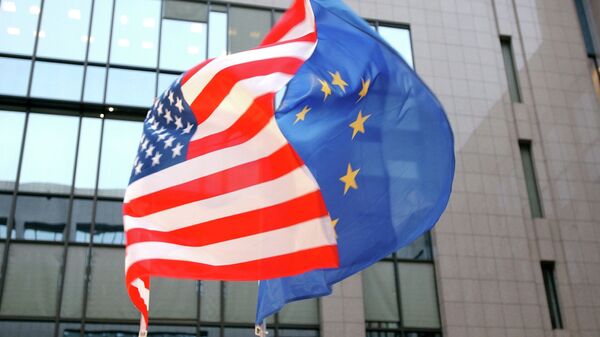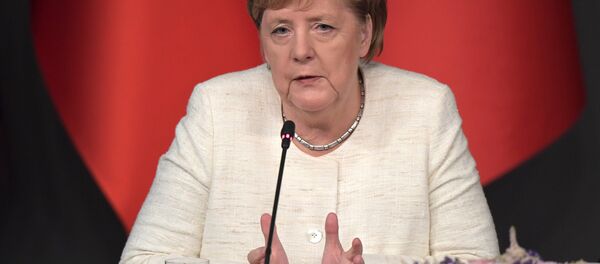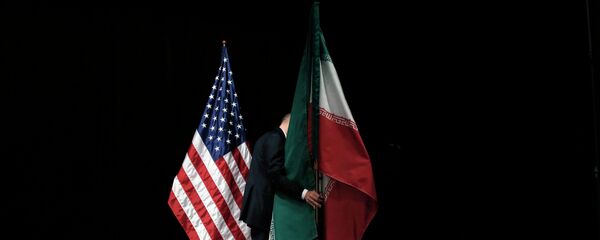Sputnik discussed Merkel's speech with Christian Schweiger, a visiting professor and chair in comparative European governance systems at the Chemnitz University of Technology.
Sputnik: In your view what has prompted Angela Merkel to take such a stance against Washington's recent decisions?
Christian Schweiger: Well, she's obviously in the limelight of her chancellorship, she's only got a limited period left, so she seems to be bolder than before to speak out, particularly on foreign policy issues.
I think she probably regards it as part of her legacy to emphasise that Germany and Europe want to maintain a multilateral approach, and she wants to distinctively contrast that with the unilateral approach, which you've just mentioned, of the Trump administration in Washington.
READ MORE: EU Ignoring Mideast Summit Shows Brussels Anger Over US Stance on Iran — Report
Sputnik: We're in this situation where we've got this general malaise between Washington and Europe, I mean, it's probably been underpinned by President Trump's attitude towards a lot of the European countries and specifically highlighting Germany in terms of them not, as he says, paying their bill when it comes to NATO expenses. Do you think that Washington currently is an ally of Europe, and if not why not?
Christian Schweiger: Well, under Trump, Washington has obviously become quite a difficult partner because Trump is unpredictable; he has unilateral tendencies, but what you've been describing, the crisis in transatlantic relations, to a large extent boils down to the fact that, obviously, Washington wants Europe and particularly Germany to do more in terms of burden sharing, spend more on military defence so that Washington can lower its spending.
That is an issue that was a bone of contention already under the Obama administration, and it goes much further back, even to probably 10-15 years ago.
So I would say under Trump the whole crisis has heated up again and has now obviously come to a point where there could be, in the long run, a complete decline or a split between Europe and Washington.
Sputnik: I think you've highlighted some interesting points, it's not just maybe this unilateral attitude and strategy of President Trump, it is also highlighting the weaknesses of previous presidents not being stronger with regard to insisting on sharing the burden in terms of NATO. How realistic is it for Europe to become more independent from the United States politically and economically? We're in uncharted waters in many ways in terms of the stance of the US president, but this is probably going to give Europe the opportunity to be more stand-alone, isn't it?
Christian Schweiger: Yes, it would be a big opportunity to now come together and, for example, under Franco-German leadership, to say: let's take Poland and some of the Central Eastern Europeans on board and let's really invest in European defence, let's build up an independent European defence capability.
The German approach seems to say: spending — yes — but mainly on civilian projects, on policing, on civilian aid, not necessarily on the military; that's at least what the German society would like to see; the government takes a slightly different approach.
The rest of Europe, particularly the Central and Eastern Europeans, would say: if you want to deepen and build up independent European defence and security capabilities, you need to, obviously, invest financially, and I cannot foresee any sort of solution to this ongoing split that we've seen for quite some time.
Sputnik: Christian, we've also got this main issue with regard to the JCPOA and Iran, obviously, very strong attitudes from the American point of view and the Europeans, and the other countries that have signed the agreement. Do you think that Europe will be able to maintain the Iran nuclear deal on its own? Obviously, it's been a few months now since President Trump withdrew from this, but Europe and the other signatories are showing some determination to continue with it.
Christian Schweiger: I think they will try, and I'm pretty sure they will do this because, of course, there's a risk that this deepens the transatlantic divisions that we currently see, that Trump will react angrily if Europe tries to maintain this deal.
READ MORE: Iran Criticises EU Trade Mechanism Aimed at Bypassing US Sanctions
But I think not just in Germany, but also in many other European member states, there's a belief that you cannot completely isolate Iran. You need to keep the diplomatic channels open, and this treaty, the treaty that was signed under Obama, has eased the tensions and enabled a dialogue with Iran.
So I'm pretty sure that the European Union, collectively, will try to maintain this, even if it comes at the expense of relations with Washington.
Sputnik: And just a question now with regard to the additional tariffs that President Trump wants to impose on European cars. Now this is something that has been discussed in the press very strongly because, obviously, the German car manufacturing market relies on the American market; it's obviously a strong exporter to America. Do you think President Trump can really hurt Germany and add additional tariffs on European cars, specifically German ones?
Christian Schweiger: I fear he might, because, as you know, he's already, for a number of years, highlighted that the German export surplus is a problem, he sees it as a major problem in American-European, and particularly American-German trade relations.
Because, as we know, he's rather rash in his decision-making, and he sometimes takes decisions without actually looking at long-term implications.
To impose tariffs on German cars and potentially other products could, of course, have long-term negative implications for America, because America is also dependent on trade with the European Union, and other European Union countries will not see that as a very cooperative step. So he will think twice, but I think in the end, he might simply act as he's done before, take a decision and wait and see what happens afterwards.
The views expressed in this article are those of the speaker and do not necessarily reflect those of Sputnik.



